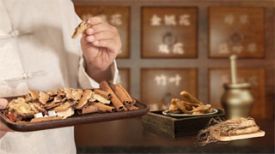
The Xia pulse is like a hook, why is it like a hook? Qi Bo said, "The Xia pulse is like a hook, the heart is also like a southern fire. The reason why all things are prosperous and long is that their qi rises and falls, so it is called a hook. If it goes against this, it will be sick. The emperor said," Why is it like a hook? "Qi Bo said," When its qi rises and falls, it also rises and falls, which is too much, it is sick outside. When its qi does not rise and falls, it goes against it, it is too late, it is sick inside. "The emperor said," If the Xia pulse is too much or too late, what are its illnesses like? "Qi Bo said," If it is too much, it will make the body hot and the skin painful, which is immersion; if it is not enough, it will make people annoyed, cough Goodness. "- Huangdi Neijing, Su Wen, Yu Ji Zhen Cang Lun, Chapter 19
Next, we will analyze the key points inside with everyone. The first paragraph that needs to be explained in detail to everyone is, "The emperor said, 'What is the opposite?' Qi Bo said, 'When the qi comes and goes, it also rises, which is called excessive, the disease is outside. When the qi does not come and goes, it rises again, which is called insufficient, the disease is in the middle.'. How do you understand this paragraph? Zhang Jiebin's annotation: "Those who go back to prosperity are not called strong. When a pulse originates from the skin, it is called coming; when it originates from the skin, it is also called going back. If it does not come back to prosperity or goes back to prosperity, it is insufficient in words and surplus in words, that is, it is more or less eliminated. Therefore, in spring, liver, summer, heart, autumn, lungs, and winter kidneys, Bian Que regards strength as too strong, illness as external; deficiency as insufficient, illness as internal. Although the words are different, the meaning is the same." Zhang Jiebin explained the principle of this paragraph to everyone clearly.
We generally believe that 'when the qi is not strong, it becomes strong when it goes', thinking that it is all strong. If it is strong, it should be surplus, it should be positive. Why has it become a deficiency syndrome here? Many people are confused and don't understand. At this point, Zhang Jiebin explained from beginning to end that the pulse jumps up from the bone and flesh division and onto the skin. When we feel the pulse, it jumps up one by one, and from the bone and flesh division to the skin, it is called "pulse jumping up", which corresponds to modern medicine. When blood vessels expand, he calls it "coming up". When I touch it, it jumps up and expands. When the pulse falls, it is called 'go'. The difference between sliding on the skin and flesh and blood is called 'go'. To come is to jump up, and to go is to fall down. This can be understood in this way.
What does' rise or fall 'mean? When it comes, there is not enough, but when it goes, there is surplus. This is called the concept of 'how much is consumed', which means that if there is not enough to make up for it, all will be consumed. This is the concept of 'how much is consumed'. Originally, summer should have had more growth and less decline, it should have been a period of prosperity and decline. However, the opposite happened, with a significant decrease in growth but a significant decrease in growth. Just like waves, the ripples are particularly strong when they go up, fall down when they go down, and then go up for a little longer before falling down again. After a while, they become weaker and weaker, which is called the concept of diminishing strength. So he said, 'Therefore, Bian Que is in the liver of spring and the heart of summer.' What does Bian Que mean? It refers to the "Classic of Difficulties", which corresponds to the "Yellow Emperor's Inner Canon". The "Classic of Difficulties" also provides a corresponding explanation in this passage, stating that "the strong in reality is too much, the disease is external, the weak is insufficient, and the disease is internal. Xu Wei is Xu, which refers to the frequent disappearance of the disease mechanism. Over time, the pulse at this time is a sign of Xu Wei, and the body is a manifestation of weakness, where the disease is present.
Going further down is the word 'immersion'. Many commentators have different ideas, and there are probably four ways to describe it. The first paragraph is Wu Kun's annotation in "Su Wen Wu Zhu": "Immersion, heat cannot be removed, immersion leads to indulgence, and the name of evil heat gradually deepens. He refers to the fact that evil heat has been lingering in the body and getting deeper and deeper. He is talking about the pathogenesis, which is the first explanation. The second explanation refers to pain, which spreads throughout the body. The meaning of immersion is spreading and spreading, referring to illness and pain. Ma Shi commented in "Su Wen Zhu Zheng Fa Wei": "The pain of immersion spreads throughout the body. This place immersion refers to a type of pain disorder. At first, it appears as a dot or small patch on the surface of the body, and then gradually spreads throughout the body, which is also known as immersion or pain spreading throughout the body. The third explanation refers to sweating. In the Commentary on the Sutra of Suwen, it is noted that "those who are immersed in it sweat, and the fire forces their lungs to sweat. This place refers to the situation where fire evil forces the lungs, fire conquers gold, fire evil forces the lungs, and the lungs control fur. At this time, when the fur of the lungs opens, the fire qi leaks out and comes out with sweat, which is called immersion.
The fourth type refers to soaking sores. As we mentioned before, the annotation in "Su Wen Zhi Jie" states: "If the heart meridian is too weak, the fire and qi will float out, causing the body to heat up and abdominal pain, and the heat will damage the skin surface, resulting in soaking sores. That is to say, after the heat pathogen hits the surface of the skin, the skin will be painful. At this time, there will be a disease called an ulcer, which is a rupture and pus discharge. The ulcer will expand and gradually spread on the skin, which is called an immersion ulcer. There are four explanations for the specialized treatment methods of soaking sores in traditional Chinese medicine. According to the unified understanding of current experts, it is believed that immersion in this area refers to a type of skin abscess, which is a type of disease. The contextual explanation here is that it causes body heat and abdominal pain, indicating immersion. From this perspective, it is more appropriate to understand immersion sores.
Further down is the phrase 'if it's not enough, it's annoying. Coughing and spitting are seen on the top, and qi leakage is seen on the bottom.' Why does this situation occur? Why are you coughing, spitting, and feeling annoyed again. Why is there still gas leakage below? Wu Kun's annotation: "If the lower meridians are insufficient, the heart and qi will be weak, and if they are weak, they will not be able to calm themselves, causing restlessness. If the deficiency yang is present in the lungs, coughing will occur; if it is present in the spleen, spitting will occur. If the deficiency yang is released, it is called qi release. What he talks about is all about deficiency of yang, which is actually deficiency of yang qi and deficiency of heart qi. After losing his composure, this person becomes uneasy, always feeling anxious and upset. In common people's words, he is like a grass growing in his heart, without any signs of decline, and he is also a little scared in his heart. When the deficiency of yang is present in the lungs, coughing occurs. This cough is caused by the lungs. It is important to note that in traditional Chinese medicine, saliva is produced in the spleen. Therefore, when the spleen is deficient, spitting occurs, and when the spleen is deficient, drooling occurs. Many children have particularly long saliva, indicating spleen deficiency. Some adults fall asleep and drool with one mouth, indicating spleen deficiency. At this time, it is necessary to strengthen the spleen. If the deficiency of yang occurs in the lungs, cough; if it occurs in the spleen, spit. The sinking of deficiency yang means that deficiency yang cannot rise. Originally, clear yang rises while turbid yin falls. Qingyang cannot rise, Qingyang falls, this is called sinking. The symptoms that occur are called gas leakage, which means frequent rotation of the arrow and gas, and excessive flatulence. This situation is due to insufficient qi and sinking of deficiency yang. At this time, we should replenish qi and promote yang, while warming the heart meridian. This disease can be cured. Similar situations are often encountered in clinical practice.
To summarize, this paragraph discusses the mechanism by which the Xia meridian is hooked, because the Xia meridian controls the heart, which belongs to the south among the five directions, and the south belongs to fire. So it corresponds to the fire evil. Summer happens to be a season when all things grow vigorously, so people's pulse also corresponds specifically to summer. So when the pulse comes, it is more vigorous when it jumps up and relatively mild when it falls down, resembling the shape of a hook. I mentioned before that the hook is a hook. We know about the clothing worn by ancient people, and the text of the Yellow Emperor's Inner Canon was written in the Han Dynasty. The clothes worn by people in the Han Dynasty were long robes with straps, which were long and tied around the body, requiring a hook to hook them in. According to the unearthed cultural relics, the back end is straight and the front end is curved, and this pulse is similar to this feeling. Don't say what the ancients said is like a hook, then how can we not feel the hook when we measure the pulse? Just remember to rise and fall. When it comes, this pulse is particularly strong, and when it goes, it is slight. When it falls down, it is slight, and when it jumps up, it is relatively strong. In this case, it is called hooked pulse. The reason why it becomes a hooked vein is because of the principle of abundant yang energy in summer. Because heaven and man correspond.
So when we study the Yellow Emperor's Inner Canon, we must remember that from beginning to end, the Inner Canon is permeated with the idea of the correspondence between heaven and man. So when it comes to explaining the pulse of the human body, it usually coincides with spring, summer, autumn, and winter. Spring, summer, autumn, and winter are not expressions of the body, they are expressions of nature, the pulse of nature. So the pulse of the human body corresponds to the natural pulse patterns of spring, summer, autumn, and winter, which is called the correspondence between heaven and man. On the contrary, it is the disease pulse. What are the manifestations of the disease pulse? If the pulse of the disease is too strong, it will rise and fall, which is called external illness, body heat and abdominal pain, and it is a soaking ulcer. The body is hot, the skin hurts, and the sores spread, which is called immersion. If the pulse is not strong enough, it will rise instead of rising. When it comes, it is weak, but when it goes, it is very strong, indicating that the illness is in the middle, that is, the illness is in the middle, worrying, coughing and spitting at the top, and qi leakage at the bottom. This is the symptom and manifestation of the body seen by heart qi deficiency.
Disclaimer: This article is a sharing of health knowledge. The drugs, prescriptions, acupuncture and moxibustion and other treatment and health preserving methods mentioned in this article should be applied under the guidance of professional doctors, and should not be applied by yourself. We are not responsible for any issues arising from improper use.


